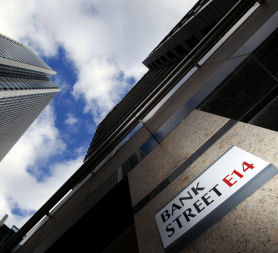£2.5bn bank profits tax made permanent
Chancellor George Osborne makes the bank levy permanent and immediate in a decision finalised on Monday by a Coalition “stung” by accusations they had given the banks a tax cut writes, Faisal Islam.

The Chancellor said that the levy would raise £800m this year and £2.5bn every year after the decision was taken not to phase the levy in, but bring it in at a higher rate in three week’s time.
He denied the move was politically motivated. He said: “No, it’s economics and the need to make sure the banks make a fair contribution to closing the budget deficit.
“The measure we have just announced means there’s an extra £800m coming in to the Treasury this year. What I have announced is a permanent tax on banks, every year banks contributing £2.5bn net.”
We need to make sure the banks make a fair contribution on closing the budget deficit. Chancellor George Osborne
However, George Osborne admitted his wrangling with the banks over bonuses continue. He said he hoped that clarifying the tax position would help him make a deal.
“I’m still confident we can secure a deal with the banks on seeing an increase in lending to small businesses and see that bonuses are lower this year than last year,” he said.
After the announcement, Mr Osborne clashed in the commons with Shadow chancellor Ed Balls. Mr Osborne said that the Government had increased the bank levy in order to deal with the budget deficit, which he said Mr Balls: ‘refuses to deal with because he is a deficit denier.’
Mr Balls responded by challenging Mr Osborne to prove he could meet his forecast of economic growth this year: ‘with no plan for jobs, no plan for growth and no plan B.’
Oddities in the announcement
It would take a very generous observer of the Treasury not to see the oddities in this morning's announcement from the Chancellor, writes Channel 4 News Economics Editor Faisal Islam.
Park for a minute that this was a tax announcement made outside of a Budget. Not in an aeon would a government committed to "Tax Simplification" want to introduce a new tax with three different rates in its first five months of existence. The bank levy kicked in five weeks ago at 0.05 per cent, it will change to 0.1 per cent in three weeks' time, and then in May it will settle at 0.075 per cent. And all because the Chancellor worked out yesterday that the banks were now healthy enough not to need a phasing in of his bank levy.
The Coalition were clearly stung by Ed Miliband's attack that bankers were getting a "tax cut" in this year, a year after the bonus tax but before the full implementation of the bank levy. Officially this was signed-off yesterday at a meeting of the Quad +1: Cameron, Clegg, Osborne, Alexander and Cable. I'm told that the Chancellor had this planned for weeks, but had not told the banks until a round of phonecalls at breakfast time. I am told that this decision was totally independent of the discussions on bonuses and lending.
Read more from Faisal Islam: will the bank tax be enough for the public?

Economic recovery role
The Chancellor said he had been planning to phase the levy in, but banks were in a healthier state so he could move more quickly. He said the banks were prepared to play their role in the recovery of the UK economy.
“The banks themselves understand they need to make a fair contribution to the economic recovery…what really matters is if we get a measurable and significant increase on lending to small and medium-sized businesses. That’s what people will want to look at when we conclude a deal, if we conclude a deal.”
Mr Osborne said he understands the public’s anger over the banks.
“I share some of their frustration,” he said.
“It would have been better if, when we were bailing the banks out, we had secured something from the banks in return. Unfortunately I was not Chancellor at the time.”
Read more on the Channel 4 News Special Report on the economy: from crash to cuts
The bank tax has split observers.
Dr Richard Wellings, the Deputy Editorial Director at free market economics thinktank the Institute of Economic Affairs, told Channel 4 News: “This is a dangerous policy which sends the wrong message to international businesses thinking of relocating and staying in the UK. It’s a fairly small amount but this is just one of many bank bashing measures and taken cumulatively, it will have an effect.
“This is mostly a political decision, it is not economics.”
But a coalition of charities and other organisations, including Oxfam and the TUC, said it was “pocket change” and the banks should pay more.
The Robin Hood Tax Campaign wants banks to pay another £20bn in taxes a year.
A spokesman said: “The public expect more than this. The bank levy is pocket change to the big banks and they will barely flinch. We need a Robin Hood Tax of £20 billion now George, to help poor people at home and abroad hit hard by the economic crisis.”